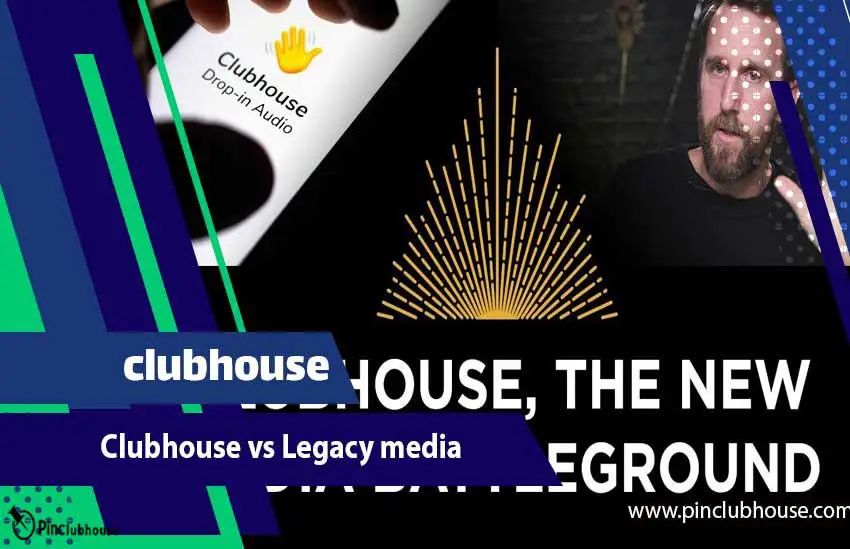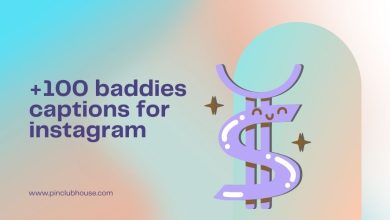
Clubhouse vs. Legacy media; In this article, we talk about Clubhouse vs. Legacy media. So stay with Pinclubhouse.
Clubhouse vs Legacy media
The Clubhouse is the new voice-only social media network that’s only existed for one year but is already valued at over $1bn and has rivals racing to create competitions. If you don’t know how to use Clubhouse yet, Click on it for more information.
The voice-live chat social media has been defined as a continual podcast that you fall in on and experience. After entry was tightly held over the last year, it’s now in its tumultuous development stage and busting through to mainstream attention, with a barrage of articles in the network, some essential moral panic over ‘gatekeeping,’ and a whole load of hype. Also, read the content on how to make money on Clubhouse.
Is the hype justified? What are the downsides and likely loss conditions of this new media environment? What light does the success of Clubhouse clear on some of the most influential divisions in culture right now?
It’s an engaging story or set of reports with significant consequences for all of us, including but not limited to a titanic fight between new tech and old network, the nature of ‘cancel culture’ dynamics on the app, and the possibility for new forms of talk and sensemaking to develop. If you want to have Clubhouse on Linux, click on Clubhouse Linux.

As Rebel Wisdom has wrapped at altitude, Tristan Harris introduced the alarm more widely. There is a growing awareness of the dangers of social media, mainly how the attention economy uses to capture, control, and fragment our understanding through outrage and emotional hijack, developing the “ethnicity to the base of the brainiac stem.”
The most encouraging read on Clubhouse is that the nature of the app has started to change that method. It awards deep concentration rather than the drive-by shootings of Facebook or Twitter. The use of audio rather than text permits a much more extensive range of communication. And it raises the potential for empathy with other views, rather than siloing us in our camps. Suggest you read the article record a Clubhouse room.
In our series, “The Psychology and Science of Polarisation/Complex discussion,” we protected how learning from concussion research shows how we can either be in an exploratory, interested physiological state or a defensive, closed one and how the vagus nerve controls that whip. The vagus links the brain to all our main organs and the gut and controls the voice box muscles. We are sharing our entire emotional state and physiological through the audio.
And this means that there is a natural screening method for realism, as we pick up lying and bullshit in the vocal tone. Over the revved life cycle of the network, several high-profile influencers have been “exposed” and called out, and effectively ejected from the conversation.
If you want to make an attractive profile, click on Clubhouse profile maker. Also, download others’ profiles in full size for free click on Clubhouse profile downloader.
Diamonds and Dross
As Gavin Haynes amusingly outlines in the page of Unheard, there is a lot of dross on the Clubhouse, with a lot of life coaches and other grifters hitting up business. However, amongst the debris, some of the world’s most successful and influential people have meaningful discussions, addressing people directly and avoiding the legacy media concierges.
Many people have watched that Clubhouse seems to be going via an accelerated learning turn. Many of the most controversial and explosive issues and dynamics of the current culture war are playing out on the app.
Last weekend, the most recent flashpoint was when the evolutionary biologist and “Intellectual Dark Web” partner Bret Weinstein was subjected to what could only be defined as a live “struggle session.” The voice has to be listened to be considered. The irony is that the room this happened in was created on the app to talk about whether Clubhouse was too fixated on ‘weakness.’ The impression given is that Clubhouse is dominated by cancel culture and ‘woke to signal.’
However, in many ways, this completely mistakes the nature of the battle taking place between the new and old concierges of big tech and the media, with Clubhouse as the main battlefield. The consequence of the fighting is in the balance yet.

The critical part of the story starts not with the recent social fairness explosions on Clubhouse but with the long and painful game of power between the new tech overlords and the old media concierges. The Clubhouse is part of the long game being played by Silicon Valley to intentionally “route around” the old power systems. Social justice shaming is one of the effective tactics *used by* the old media power systems to try and keep big tech in its place and maintain its position as relied concierges.
The leading investors in Clubhouse are the hugely significant-tech venture capitalists Andreessen Horowitz. The battle between old media and the big tech was unusually personalized between Taylor Lorenz Marc Andreessen and New York Times tech journalist. She argued on Twitter, incorrectly, that Andreessen had used “the r-word” in a Clubhouse discussion. She refused to apologize when she was corrected and locked her Twitter account. In the aftermath of this, she co-published a report in the New York Times that likely. That Clubhouse was a cradle of racism and antisemitism: “[Clubhouse’s] development has been attended by criticism that women and people of color are regular targets of misuse and that talks involving racism, antisemitism, misogyny, and homophobia are on the rise.”
Another more balanced article by Kevin Roose in the New York Times is how Clubhouse seemed to be going through the entire evolutionary arc in an accelerated timeframe:
“all successful social media has a life process that goes something like: Look at all the exciting and funny ways people are using it! Oh, this app sure is addictive! Wow, see, I can get my news and political article here, too! This will assign heretics, encourage free speech and topple authoritarian regimes! Why are racists and trolls getting millions of followers? And where did all these plot ideas come from? This platform should employ some moderators and set its algorithms. Look, this place is a hellhole. I’m deleting my account.”
But something is different about Clubhouse in that its primary starting point was by getting together the influencers of Silicon valley in one place. In a posting on Other life, Justin Murphy argues that the Lorenz/Clubhouse spat should be seen as a sign of “distress in the face of an existential danger” on the part of the New York Times. He claims it disrupts the critical “view former” market that previously belonged to the legacy media and the New York Times. It’s also a battle between journalists who essentially earn power from their platform versus predominantly self-made belief formers who set their platforms or followings themselves.
“The system of the Clubhouse app is deep. Because it allows high-status people whose status is founded on superior belief-calibration (successful inventors, by report) to calibrate their thoughts privately, and also, paradoxically, to a listener”, Murphy writes. ” For high-status, someone whose problem is founded on reputation organizations, their only reason is the historical ineptitude of other status individuals to calibrate and spread their ideas alone. Prestige idea writers once solved a coordination problem for high-society. However, not everyone would agree with any given prestigious idea writer. They supplied a focal point and the basic beliefs which all high-society players could think that all other high-society would respect.”
Good Opinion
In the “Deep Code” movie on Rebel Wisdom, tech entrepreneur and culture hacker Jordan Hall describes one of the vital coordinating parts of elite society. And particularly elite media is to orient people to “good opinion,” to blend a large group of people towards the “right” ideas to keep. This is the basic function of idea writers and famous columnists in places like the New York Times, to map out the agreed ways to think.
Performative wokeness has increasingly become an “elect signifier,” and conflict shows ejection from legacy organizations in the US, as we saw recently with the sacking of Don McNeil from the New York Times. It is a hugely influential weapon in the hands of those who choose to use it. The surprising side impact of the tech apps consuming the network means that American culture war dynamics have now been exported worldwide. Even though we’re all Americans in our media diet, its organizations seem more helpless to idealistic capture.
Far from being a media overlooked by wokeness, Clubhouse is where those deemed beyond the pale or “problematic” by legacy media have created traction and power.
Murphy explains how he was able to see a live exchange in real-time where a gun-rights activist, Kyle Kashuv, was met with racist messages that he’d sent as a teenager.
“They talked it out, maturely on both sides. Kyle clarified his embarrassing view of his past conduct, and a fruitful conversation was had about youth in the digital age. Kyle’s one-time use of racist language was never explained, but neither was it plagued over with hours of joint self-flagellating integrity display. It was ideal appropriate human discourse from a varied cast of fascinating characters. Compared to what you’ll find in almost any other general or semi-general globe available today.

In the example above, I got a short and plain statement of this Kyle Kashuv kid, which doesn’t let me say too much about him but allows me fast and confidently reject any false information about him. For example, if I read in the NewYorkTimes tomorrow that he is a “white supremacist,” it would be psychologically unbelievable for me to incorporate that into my neural web, and the only possible outcome is that my concern for the New York Times decreases drastically.”
The recent New York Times hit-piece by tech reporter Cade Metz about the rationalist blog Slate Star Codex, hugely influential in Silicon Valley, was another instance of this ongoing conflict. The entire style of the report was to try and link the writer, Scott Alexander, to “problematic” formations such as Charles Murray, by marginal misrepresentation and distorted coverage.
While there are causes to be concerned about moderation on Clubhouse, as, with any social network, allegations of it being a cradle of bigotry made by the likes of Taylor Lorenz at the New York Times. It should be seen that social justice problems are being used as a spear against places that try to avoid the legacy media’s concierge role. Lorenz, Cade Metz, and others are saying it’s “their job” to determine what is and isn’t “problematic.” The tech businesses are expressing. We’re going to route about your outdated power systems. The ‘social justice’ shaming is one of the most effective tools in the armory of the legacy media organizations, and that’s why they are using it.
As what occurred to Bret Weinstein established, the artistic battle between anti-wokeness and wokeness is playing out entire ranking on Clubhouse. Much as elsewhere in culture, you could even claim that Clubhouse is becoming the new base zero for the battle. However, it’s essential not to stretch what happened in this one room. The moderation system on Clubhouse means that whoever is running or moderating the rooms has the power to shape the discussion on them. In the room where this occurred, the actual moderator gave over control of the room to an activist. They then kicked off dissenting audios and created what was in exercise a virtual totalitarian state done with the battle session.
There are numerous reasons why Clubhouse may die as it increases and weakens the quality of the discussion, but it’s unlikely to be shamed into ending by legacy media gatekeepers.
Conclusion of Clubhouse vs. Legacy media
In this article, we talked about Clubhouse Vs. Legacy media. We hope this article was helpful for you. Suggest you read the contents of Clubhouse username, Clubhouse PC, how to mute on Clubhouse. Share your comment about Clubhouse vs. Legacy media.





